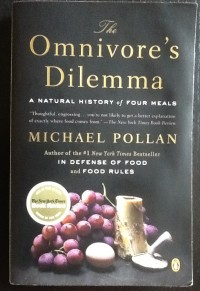The Omnivore’s Dilemma, by Michael Pollan is a fascinating look into our food. Some of the main points include:
1. The original source of all energy is the sun. It’s energy is captured by plants which form the first link in the earth’s food chains.
2. The industrial food chain traces almost exclusively back to corn, either by using it to create food products like high fructose corn syrup or feeding it to the animals that become our meat products.
3. Because we rely so heavily on corn for industrial food, farms are forced to plant it exclusively. These monocultures deplete the soil, making oil based fertilizers and chemical pesticids essential.
4. Organic farms attempt to avoid oil based fertilizers and chemical pesticides. Nonetheless, today’s organic food market is industrialized, linking it to fossile fuels through certain necessities such as long distance transport.
5. Hunting and gathering are an important part of our natural heritage and therfore instructive, even if they are no longer viable options for the human species.
What I found most impactful was the idea of following food chains back to their first link. This is usually plants, which have the ability to directly capture the sun’s energy through photosynthesis. Thanks to this arrangement, the sun’s energy is ready to be passed along to the organisms that feed off the plant, and then to the animals that feed off of them. The understanding that the sun is the primary source of the planet’s energy and that plants can make it available to other organisms is very important; we all would do well to reflect upon it. We are truly blessed by this system which, as long as it is in place, is virtually endless. Protecting it is of vital importance to our health.
The Omnivore’s Dilemma lays out a very interesting look at how we humans have managed to modify this basic natural premise. We use the stored energy found in oil to suppliment energy transfer. Chemical fertilizers and pesticides are created from oil, which allow us to grow plants (specifically corn) under conditions in which it ordinarily would not thrive. This huge, artificial production feeds the industrial, processed food industry.
How does this relate to fitness? Firstly we have to consider the nutrition of the food that we create. Because we have chosen corn to be the key plant at the base of our food chain we are married to its nutritional properties. According to Pollan, corn makes up a huge percentage of the ingredients found in our foods, and not merely as additives like high fructose corn syrup, whose negative impact on health is already widely known, but also as feed for meat producing livestock. Cows even show signs of the very same metabolic disease we observe in humans. To make a long story short, these ingredients end up acting on our blood chemistry in negative ways.
Beyond that, there is the larger philosophical question about sustainability. This is raised by Pollan, and can be considered in fitness. Fitness is after all an attempt at sustaining health and quality of life. We might do well to consider the idea that our bodies are products of nature and reflect the natural systems around us. Perhaps we can learn something about sustainability not by thinking about distant rain forests, but by examining ourselves. What do our soaring rates of lifestyle related disease tell us about our use of the environment? If we are fairing poorly with the products we have created, how are the ecosystems that we draw them from doing? If our food chain is artificially sustained, are we not by default also artificially sustained? If turning away from industrialized, processed food can help to restore our personal health, what might it do for the planet? I am convinced that taking an interest in your own personal fitness can provide some interesting and useful insights into broader topics like these, which can benefit your life and ultimately the life of the world we live in.
